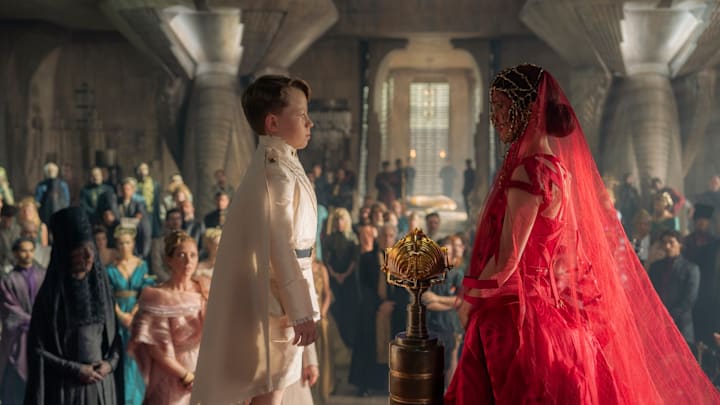HBO's latest show Dune: Prophecy enters the unique sci-fi world created by Frank Herbert. The show follows the Sisterhood, an early iteration of what will eventually become the Bene Gesserit, a religious order that manipulates the most powerful families in the universe. Thanks to their abilities such as Truthsaying, the sisters are prized by the nobility, and often serve as advisors, including to the Emperor himself, as they arrange marriages and manipulate the bloodlines to create the best rulers.
Politics and religion are at the forefront of the Dune universe and are central elements in this show. The Bene Gesserit have always been one of the most interesting parts of this world, and it's intriguing to see the way they develop under the leadership of Valya Harkonnen, as she works to rebuild her family's broken reputation.
The show is set in the same universe as Denis Villeneuve's two Dune movies, and you can feel the connection. For the most part, they look similar, with regal clothes, grand architecture, and a certain brutalist aesthetic that makes it feel like a place you wouldn't really want to live. There's one exception in this episode: the scene where Ynez and her brother visit the nightclub. Just the thudding bass track and general appearance make it seem more like something that could've come out of a Tron movie. Naturally, considering this is a relatively short show, it does not have the same scale as the ones you see in the movies.
The fact that it does feel like Villeneuve's movies, despite being set 10,000 years before shows how a lot of innovation and technological advancement have stalled after the Butlerian Jihad, when advanced computers and artificial intelligence were outlawed, leading to humans developing new ways to advance their own abilities to compensate for this. It must make the logistics of administering a massive empire difficult.
As far as story and characters go, it looks to be going the route of a political thriller, with more focus on the machinations of those in power, rather than action scenes and special effects. Most of the characters are either in positions of power, or else would like to be, and there doesn't seem to be anyone you particularly want to root for, which fits with the suspicious way these works approach anyone who looks like an altruistic hero.
You can get why Valya is doing what she's doing, and it certainly takes a lot of effort to craft such an elaborate plan, but she's not what you'd call relatable. Of the whole cast, Desmond Hart looks like he could be the most interesting. He's definitely a mysterious character, with no clear motives and a shady past during his time on Arrakis, which I'm excited to find out more about.
After seeing the first episode, I can say Dune: Prophecy is an enjoyable show to watch. It has a long lead-in, with at least the first ten minutes being devoted to exposition and backstory, but that can be forgiven with a show that's entering a world as complicated as this. Unlike its movie counterpart, it didn't blow me away or make me think I was watching a contender for the greatest show I'll see this year, but it did grab me with its intriguing story and worldbuilding, and I need to see where it leads.
Don't miss new episodes of Dune: Prophecy Sundays at 9/8c on HBO.
